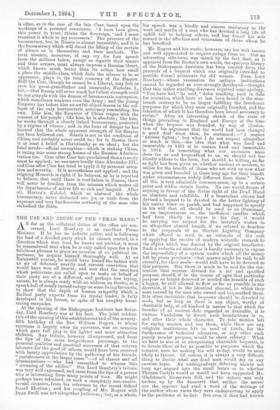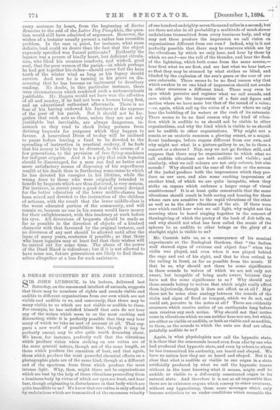THE USE AND ABUSE OF THE " DEAD HAND."
AS far as the collateral duties of the office are con- cerned, Lord Rosebery is an excellent Prime Minister. If he has no definite policy, and is following the lead of a divided party which he cannot control, in a direction which may tend he knows not whither, it must be remembered that when he is only called upon for a few felicitous phrases to grace an occasion of no political im- portance, he acquits himself thoroughly well. At an Eatanswill contest, he would have kissed the babies with an air of debonair suavity and earnest conviction that would have won all hearts ; and now that the sacrifices which politicians are called upon to make on behalf of their party are of a different, and perhaps less trying, nature, he is always ready with an address on Burke, or a speech full of neatly turned eulogy on some living favourite, to show that the depth of human sympathy which a Radical party expects from its titular leader, is fully developed in his breast, in spite of his naughty horse- racing escapades. At the opening of the Bishopsgate Institute last Satur- day, Lord Rosebery was at his best. The joint celebra- tion of the opening of this establishment and of the seventy- fifth birthday of the Rev. William Rogers, to whose exertions it largely owes its existence, was an occasion which gave full play to his lighter and more attractive abilities. Any tribute, however ill-expressed, and from the lips of the most insignificant personage, to the personal qualities and practical successes of that veteran labourer for the good of others, would have been received with hearty appreciation by the gathering of his friends, " parishioners in the larger sense "—of all classes and all denominations — who had assembled to witness this " crowning of the edifice." But Lord Rosebery's tribute was very well expressed, and came from the lips of a person who is interesting from many points of view. He might perhaps have refrained, on such a completely non-contro- versial occasion, from his reference to the recent School Board Election ; and his coupling of Mr. Rogers with Dean Swift was not altogether judicious ; but, as a whole, his speech was a kindly and sincere testimony to the work and merits of a man who has devoted a long life of uphill toil to helping others, and has found his sole reward in the affection and veneration of those whom he. has benefited.
Mr. Rogers and his works, however, are too well known. and well appreciated to require eulogy from us. But an interesting side-issue was raised by the fact that, as it appeared from the Rector's own works, the spacious library of the Bishopsgate Institute has been erected from the proceeds of a bequest which was originally intended to, provide flannel petticoats for old women. Even Lord Rosebery—whose veneration for antique institutions, cannot be regarded as over-strongly developed—thought that this rather startling diversion required some apology. " You have had," he said, " doles reaching back in date for centuries, which have at last been found in the nine- teenth century to be no longer fulfilling the beneficent purposes for which they were originally founded, and the• intention of which it has therefore been found necessary to revise." After an interesting sketch of the state of thiegs prevailing in England and Europe at the time when the bequest was founded, by way of illustra- tion of his argument that the world had been changed a good deal since then, he continued :—" I respect ancient lights ; ' but what I do not respect altogether so much is this,—the idea that what was fixed and i immutable in 1481 is to remain fixed and immutable in 1894. In venerating what our ancestors have done for us and bequeathed to us, we should not too. blindly adhere to the form, but should be willing, as far as light has been given us, whether ancient or modern, to utilise for the benefit of those who are with us now what was given and founded in times long ago for their benefit under circumstances widely different from these." Now all this is very admirable common-sense, up to a certain. point and within certain limits. No one would dream of arguing in favour of the divine right of the Dead Hand as absolute and infallible. If a benevolent citizen had devised a bequest to be devoted to the better lighting of his native town or parish, and had happened to specify- in his will that oil should be used as an illuminant, as an improvement on the inefficient candles which. had been chiefly in vogue in his day, it would be carrying our respect for the testator's wishes to, an altogether absurd length, if we refused to hearken to the proposals of an Electric Lighting Company which offered to send in an estimate of the cost of applying the results of modern scientific research to the object which was desired by the original benefactor. Such a reductio ad absurdum, is hardly necessary to expose the impossibility of a system under which all the money left by pious penitents—that masses might be said, to all eternity, for their souls—would still have to be devoted to this purpose. But there is much to be said for the con- tention that monies devised for a set and specified purpose, should, if in the course of ages that particular purpose no longer deserved or needed the benefits of such a legacy, be still allowed to flow as far as possible in the direction, if not in the identical channel, to which they were turned by the man who owned and bequeathed them.. It is often inevitable that bequests should be diverted in mode, but as long as there is any object, worthy of charitable help, at all kindred in nature to that which the founder of an ancient dole regarded as desirable, it is. wanton Vandalism to divert such benefactions in re, and alter their whole character. To take monies left for saying masses, and use them, while there are any religious institutions left in need of funds, for the furtherance of technical education, or any other such purely secular purpose, would be sheer robbery. What we have to aim at in reorganising charitable bequests, is to devote them as far as possible to purposes which the testator, were he making his will to-day, would be most likely to favour, Of course, it is always a very difficult thing to decide what any dead man would say on any current topic. An undergraduate debating society not long ago argued into the small hours as to whether Thomas Carlyle would or would not have supported Mr. Gladstone's Home-rule Bill, and the debate was only broken up by the discovery that neithot the mover nor the opposer had read a word of the writings of the author whose views they were endeavouring to apply to the problems of to-day. But even if they had known every sentence by heart, from the beginning of Sartor Re8artu8 to the end of theLatter Day Pamphlets, the ques- tion would still have admitted of argument. However, the wishes of a testator usually present a rather less recondite problem. In the case in point, for instance, what more definite lead could we desire than the fact that the object expressly specified was flannel petticoats ? Evidently the legator was a person of kindly heart, but deficient circula- tion, who liked his creature comforts, and wished, good soul, that the poor women of the parish—in which perhaps he bad got together his riches—should never feel the keen tooth of the winter wind as long as his legacy should survive. And now he is turning in his grave on dis- covering that he has become an incitement to desultory reading. No doubt, in this particular instance, there were circumstances which rendered such a metamorphosis justifiable. Mr. Rogers would not have won the affection of all and sundry, if he had not been a human being first, and an educational enthusiast afterwards. There is no fear of his having endowed his Institute at the expense of the poor of his parish. But it should not be for- gotten that such acts as these, unless they are not only justifiable but inevitable, are always dangerous, in- asmuch as they tend to check living persons from devising bequests for purposes which they happen to favour. A benevolent Dives of to-day will be inclined to pause before leaving a fund. to be devoted to the spreading of instruction in practical cookery, if he feels that his money is likely to be diverted, in the course of a few generations, to the provision of free flying-machines for indigent cripples. And it is a pity that such legacies should be discouraged, for a man can find no better and more satisfactory means of disposing of his superfluous wealth at his death than in furthering some cause to which he has devoted his energies in his lifetime, while the wrong done to those who were originally intended to benefit by bequests which are thus distorted, is very serious. For instance, in recent years a good deal of money devised for the better education of the lower middle-classes has been seized and devoted to the instruction of the children of artisans, with the result that the lower middle-class is the worst educated portion of the community, and will remain so, because no one in his senses would leave money for their enlightenment, with this tendency at work before his eyes. All diversions of bequests should be made as far as possible in the direction of objects of a kindred character with that favoured by the original testator, and no diversion of any sort should be allowed until after the lapse of many years, centuries if possible; so that those who leave legacies may at least feel that their wishes will be carried out for some time. The abuse of the power of the Dead Hand is ridiculous ; but if it is not allowed to have some use, future generations are likely to find them- selves altogether at a loss for such assistance.



















































 Previous page
Previous page